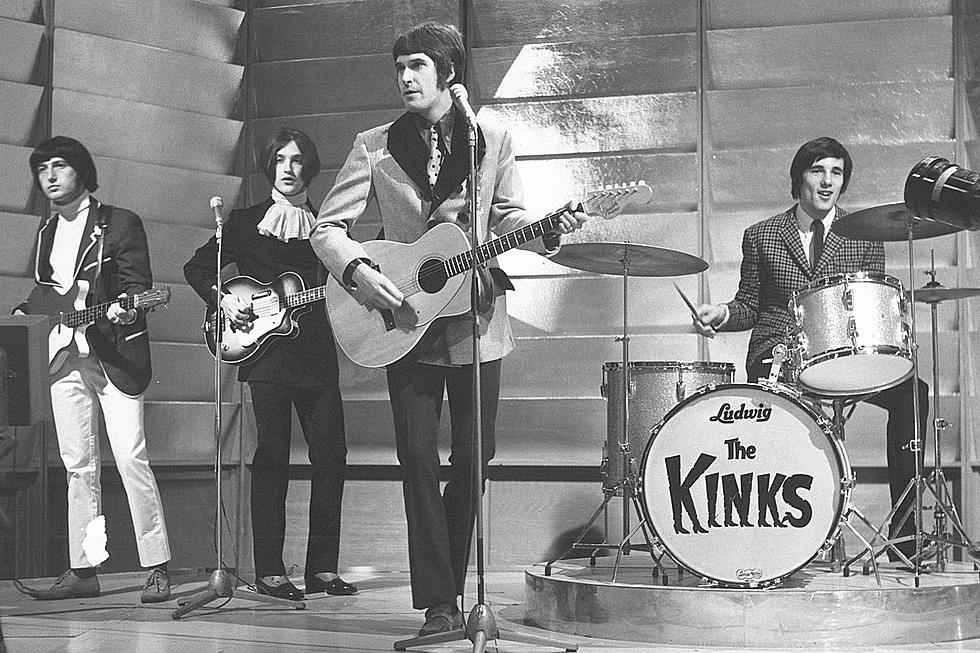
Why the Kinks’ Resurgence Ended With ‘Word of Mouth’
In the late ’70s, the Kinks had returned from the dead. After establishing themselves as one of the most raw and creative bands of the British Invasion, the band had disappeared down the rabbit hole as frontman Ray Davies continued to chase ideas about album-length soap operas.
In 1977, the Kinks woke up on the ironically named Sleepwalker album. Their first recording on the Arista record label featured Ray and the boys shunning concepts in favor of merely good songs.
The Kinks’ six-album run on Arista is often termed the band’s “arena rock” era – both derisively and accurately, as the Kinks were finally able to pack huge venues in the United States. While re-establishing the group as a massive live act, the streak featured high-charting albums and the Kinks’ biggest hits since the ’60s (most notably, the MTV-fueled smash "Come Dancing"). But all good things – even "Better Things" – must come to an end, which is what happened with the release of Word of Mouth on Nov. 19, 1984.
Their final studio album for Arista (and 21st or 23rd in the Kinks' career, depending on how you count) was crafted during a somewhat tumultuous period for the band. Following his breakup with Pretenders frontwoman Chrissie Hynde, Ray threw himself into a musical film project called Return to Waterloo, which he wrote, directed and scored.
Kinks lead guitarist Dave Davies objected to how much time his brother was spending on something other than the band.
Watch the Kinks Perform 'Do It Again'
Meanwhile, Dave continued to fight with long-running drummer (and Ray’s best friend) Mick Avory, a feud that had existed since the ’60s. When recording a track for the new album, Good Day, Ray was so hesitant to work with Dave and Mick at the same time, he decided to use a drum machine on the song. Dave eventually demanded Avory’s departure, and the drummer was fired during the Word of Mouth sessions – although his drumming is heard on three tracks. Former Argent drummer Bob Henrit took his spot.
With at least some of the Kinks personal and personnel issues settled, the band completed the 11-track LP. To fill out the record, Ray ended up using three compositions he had written for Return to Waterloo (and would appear in the movie and on the soundtrack in only slightly different versions).
Two of the three songs dwell on losing a child, either to the inevitability of growing up ("Going Solo") or under more mysterious circumstances ("Missing Persons"). The latter, a mournful ballad, is the most affecting moment on Word of Mouth.
Conversely, kick-off track "Do It Again" is the most exciting song on the album, with its crashing "Hard Day’s Night"-like opening chord and Dave’s buzzsaw crunch that accompanies the verses. It’s lyrics might provide some insight into Ray’s state of mind during the “arena rock” years. “Stuck between tomorrow and yesterday / Between now and then / Now we’re back where we started / Here we go ’round again / Day after day I get up and I say / 'Come on, do it again.'”
Listen to the Kinks Perform 'Living on a Thin Line'
It wasn’t the only tinge of autobiography on Word of Mouth. Dave Davies’ "Living on a Thin Line" (one of two songs he penned for the record) finds the guitarist comparing the Kinks’ precarious position with England’s violent past. Like Ray, Dave is uncertain about how to move forward, although he sounds less disillusioned (“Does it ever really matter?” he asks, before responding “Yes it really, really matters”).
"Living on a Thin Line" is the moodiest song on the album, and might sound the least dated decades later, considering its understated use of synthesizers. Like many records recorded by huge rock bands in the mid-’80s, Word of Mouth is a bit too processed, compressed and glossy for its own good. The "Come Dancing"-meets-"Sugar Sugar" synthesizer on "Too Hot" only underscores the track’s status as pure filler. Elsewhere, the title track attempts to turn an unstable riff into a Rolling Stones-y groove that’s not even worthy of Dirty Work.
Despite some shortcomings, Word of Mouth earned fair-to-positive reviews upon release and did fairly well on the Billboard charts (No. 57 – respectable but still the Kinks worst showing since 1974). The record’s standout singles fared better.
Although "Do It Again" was the bigger commercial success at the time of release (just missing the Top 40, and becoming the Kinks’ last song to chart in the U.S), minor radio hit "Living on a Thin Line" would earn even more fame a few years down the road. The song was played repeatedly in The Sopranos third season episode "University," and became one of the series’ signature musical moments. Apparently mobsters, rock and rollers, and the English empire have plenty in common.
Following the album’s release, the Kinks’ would part ways with Arista, leaving behind a great run of records containing not just hits, but electrifying music and thoughtful lyrics. While the Kinks would soldier on for three more albums over the next decade, the band would never regain the spotlight after Word of Mouth.
See the Kinks Among 1981's Best Rock Albums
More From Ultimate Classic Rock









